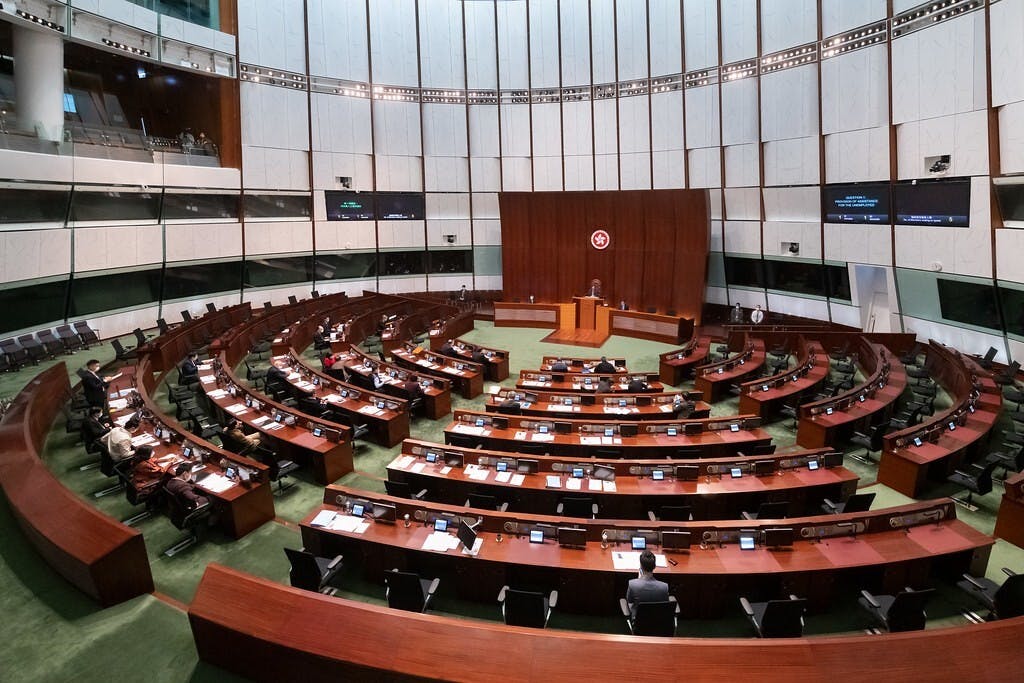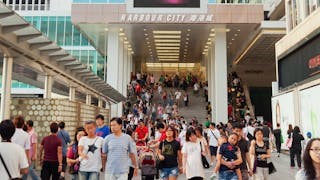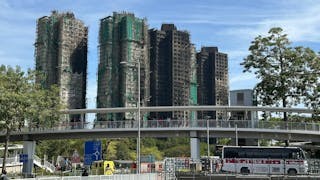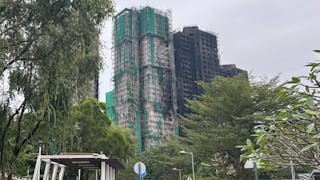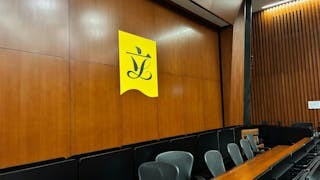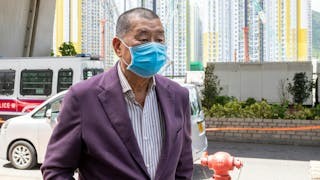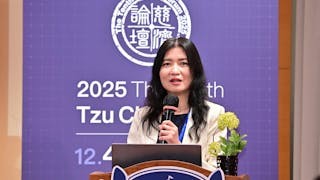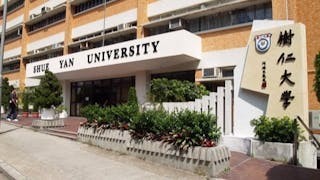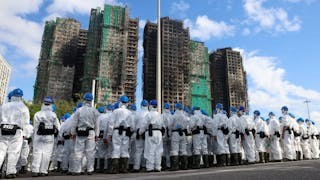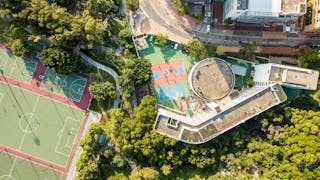從香港事態的迅速發展和上周中國官員的講話來看,實行愛國者治港正在經歷制度化進程,其中包括不可避免的選舉改革,以重新「穩定政治制度」。
2月22日,國務院港澳辦主任夏寶龍出席北京舉行的「落實『愛國者治港』根本原則」專題研討會並講話。他指出,要確保「一國兩制」實踐行穩致遠,必須堅持「愛國者治港」;「愛國者治港」是香港回歸祖國這一歷史巨變的必然要求;「愛國者治港」是全面準確貫徹「一國兩制」方針必須遵循的根本原則;「愛國者治港」是推進「一國兩制」事業的時代呼喚。
夏寶龍又提出「愛國者治港」的三個標準:一、 愛國者必然真心維護國家主權、安全、發展利益;二、愛國者必然尊重和維護國家的根本制度和特別行政區的憲制秩序; 三、愛國者必然全力維護香港的繁榮穩定。
勢踢走反中亂港分子
他還對香港特別行政區的管治精英提出了幾點要求,一是全面準確貫徹「一國兩制」方針;二是堅持原則、敢於擔當;三是胸懷「國之大者」;四是「精誠團結」。
夏寶龍的講話中最有趣的部分,是批評那些「反中亂港分子」進入特別行政區的治理架構,包括立法會、行政長官選舉委員會、區議會等機構。他說,這些人利用這些平台散播港獨主張,抗拒中央管治,煽動對內地的不滿情緒,肆意阻撓特別行政區政府施政,損害香港市民福祉,不惜讓全香港社會付出沉重代價。他指出,這些人能夠「興風作浪,坐大成勢」,就是「愛國者治港」的原則「還沒有得到全面落實」。
夏寶龍表示,落實「愛國者治港」原則,要完善相關制度,「特別是要抓緊完善有關選舉制度,確保香港管治權牢牢掌握在愛國愛港者手中」。
目前尚不清楚能否及時進行選舉制度改革,以趕及今年9月舉行的立法會選舉。不過,全國港澳研究會理事田飛龍2月25日接受香港有線電視訪問時表示,完善選舉制度需要3個月時間;2月27日,政制及內地事務局局長曾國衛表示,仍有很多未知之數,如果中央有決定,特區政府會全力配合本地立法工作。若然未知的因素是中央政府是否決定在香港迅速展開選舉改革工作,那麼,接下來的日子,我們將會看到更加清晰的選舉改革藍圖和路線圖。
The Politics of Implementing Patriotism in Hong Kong
Judging from the rapidly developing events in Hong Kong and the remarks made by the officials of the People’s Republic of China (PRC) last week, the politics of implementing patriotism is now undergoing a process of institutionalization, which includes inevitable electoral reforms to “re-stabilize” the political system.
On February 22nd, the Director of the PRC State Council’s Hong Kong and Macau Affairs Office, Xia Baolong, delivered an important speech during a seminar on the implementation of the principle of “patriotic people ruling Hong Kong” in Beijing.
Xia made four main points on patriotism (Ta Kung Pao, February 23, 2021, p. A1). First, the core idea of realizing the principle of “one country, two systems” is to implement “patriotic people ruling Hong Kong.” Second, the issue of “patriotic people ruling Jong Kong” can be a timely call for the promotion of the enterprise of “one country, two systems.” Third, one must persist in the “objective criteria” of “patriotic people ruling Hong Kong.” Fourth, implementing the principle of “patriotic people ruling Hong Kong” needs to improve the existing and related systems.
Xia raised three criteria of “patriotic people ruling Hong Kong.” First, they must “wholeheartedly protect national sovereignty, security and development interests.” Second, they need to “respect and protect the foundation system of the nation and the constitutional order of the Hong Kong Special Administrative Region (HKSAR).” Third, they must protect Hong Kong’s prosperity and stability.
He also expressed four requests on the ruling elites in the HKSAR. First, they must “accurately” implement the principle of “one country, two systems.” Second, they have to persist in the principle and be bold in shouldering their responsibilities.” Third, they must embrace “a broad national acumen.” Fourth, they must be “sincere and united.”
The most interesting aspect of Xia’s speech is that he criticized those people who were “anti-China and causing chaos in Hong Kong” for entering the HKSAR’s governing structures, such as the Legislative Council, the Chief Executive Election Committee and District Councils, through all kinds of elections. These people, according to Xia, have made used of the political structures as “platforms” to spread politically unacceptable ideas, to resist the central government’s governance and to instigate public discontent and dissatisfaction with the HKSAR administration. Xia remarked that the root of the entry of these people into the political structures was that the principle of “patriotic people ruling Hong Kong” was “not comprehensively implemented.”
As such, Xia said that, to implement the idea of “patriotic people ruling Hong Kong,” the electoral system will have to be adjusted to “guarantee fair, just, open elections” and “to stop those who are anti-China and causing chaos and those who are the international elements of opposing the PRC from entering the HKSAR’s power structures.” He added that the Hong Kong electoral system must not simply copy from the West and that it should be suitable for the local circumstances. Moreover, the “executive-led system” will have to be realized and implemented, with the Chief Executive playing a core role in the political system to improve the electoral system, to enhance governing capacity, to elevate governing standard, and to promote good governance.
Xia’s politically significant speech was followed up immediately by the HKSAR government on February 23rd, during which the Secretary for Constitutional and Mainland Affairs Erick Tsang Kwok-wai remarked that the government would revise the existing related legislations in the Legislative Council (LegCo) to delineate the criteria of whether existing District Council members would be disqualified and barred from participating in elections for five years. The draft legislation on the public officers, including those who participate in elections and who are currently serving ones, is composed of six aspects: (1) the legislation clearly states that one has to abide by the Basic Law and be loyal to the HKSAR; (2) District Council members will have to take the related oaths; (3) the existing oath and declaration legislation is going to include concrete demands, notably the effect of those who refuse to take the oaths or who neglect to do so; (4) the persons who supervise the oath-taking ceremony will be standardized; (5) a related mechanism over the existing legislations on LegCo and District Council will be spelt out, stipulating that those who violate the oath-taking requirements or who do not conform with the need to “support the Basic Law and be loyal to the HKSAR” will lose the eligibility of becoming public officers; and (6) restrictions will be added to the existing elections held for the Chief Executive, LegCo members and District Council members so that anyone who violates, refuses, or neglects the oath-taking requirements will not only lose the eligibility of being public officers but also be barred from being nominated and elected within five years.
Tsang added that the revisions of the existing legislations are in conformity with the interpretation of the Basic Law’s Article 104 as interpreted by the Standing Committee of the National People’s Congress (SCNPC) in November 2016. The revised legislation will be submitted to the LegCo for deliberation on March 17th.
He also mentioned that, procedurally in the process of disqualifying elected public officials, the Secretary for Justice will be able to, in accordance with Article 73 of the LegCo Ordinance or Article 79 of the District Council Ordinance, seek the court’s action to declare an elected officer concerned to lose his or her seat. Once the Secretary for Justice initiates such legal proceedings, the public officer concerned would automatically terminate his or her office until the court makes the final decision. Third, if the public officer concerned is dissatisfied with the court decision, he or she can appeal directly to the Court of Final Appeal to speed up the process of appeal. Hence, “a super-appeal system” will be established.
Most importantly, a list of positive and negative elements that will lead to the process of disqualification will be delineated and codified. Positively, those public officers who are secure in the political system embrace those (1) who support the PRC constitution and the HKSAR’s constitutional order; (2) who protect the PRC national sovereignty, national unity, territorial integrity and national safety; (3) who support the fact that HKSAR is an inseparable part of the PRC and that the central authorities can exercise its governing power over the HKSAR in accordance with the Basic Law; (4) who maintain Hong Kong’s prosperity and stability under the parameters of the Basic Law: and (5) who are loyal to the HKSAR and protect its interests. Negatively, those who will be subject to disqualification include the following features: (1) engaging in action and behavior that endangers national security; (2) refusing to accept the PRC’s exercise of its sovereignty over the HKSAR; (3) “publicizing or supporting the idea of ‘Hong Kong independence’;” (4) seeking the help of foreign government or external organization to intervene in the HKSAR affairs; and (5) denigrating or degrading the national symbols such as the national anthem.
On February 23rd, the website of HK01.com reported that five models are proposed for the idea of implementing “patriotic people ruling Hong Kong.”
First, an authoritative mechanism would be established to screen out the candidates participating in the Chief Executive, LegCo and District Council elections. Another possibility is to revamp the existing Election Commission by adding and making political appointments so that the Commission would become an effective screening mechanism.
Second, the Chief Executive Election Committee (EC) would abolish the part in which District Council members would become EC members. Currently, District Council members have 117 seats that will very likely be occupied by the democrats. If the seats occupied by District Council members were abolished or curbed, other sectors would have to increase its seats, including the sector including the members of the Chinese People’s Political Consultative Conference (CPPCC).
Third, the LegCo’s geographical constituencies will likely be changed from having five large constituencies to increasing them to eighteen or even twenty constituencies in which only a very few, say two, candidates would be elected to the legislature. The idea is to make each of the constituencies smaller so that the small groups with politically radical members will find it very difficult to be elected. Another possibility is to change the five large constituencies into eight or nine constituencies so that, in each constituency, three to five candidates would be elected to the legislature. While the first alternative would more likely make radical democrats difficult to enter the LegCo, the second alternative has been questioned by some pro-government elites as problematic, because the democrats remain quite strong in direct elections during which the proportion of democratic votes is often 55-60 percent and that of pro-government votes is 40-45 percent.
Fourth, LegCo’s functional constituencies will likely be changed, especially the five super-seats in which the candidates are returned from District Councilors and then they compete in direct elections. Replacing the super-seats constituency will likely be new functional constituencies that may lead to candidates elected to LegCo through consultation rather than elections. In this way, the democrats will find it very difficult to get half of the seats in the LegCo.
Fifth, LegCo candidates returning from super-seats through District Councils will likely be curbed by a revamp of the super-seats constituency which will simply incorporate the “social community service groups,” which will likely be pro-government and pro-Beijing patriotic organizations.
It remains unclear whether the electoral reforms can be handled quickly and timely so that there will be elections in September 2021. However, a mainland expert on Hong Kong, Tian Feilong told the Hong Kong Cable TV news on February 25 that three months would be needed to formulate and finalize election reforms. On February 27, the Secretary for Constitutional and Mainland Affairs Erick Tsang said the situation remains unclear, and much depends on the central government’s decision. If so, the unknown factor will be whether the central authorities decide to push forward its electoral reform plan quickly in the HKSAR. The coming weeks and the next two months will witness a much clearer roadmap and blueprint for electoral reform.
In short, the last few days have witnessed unprecedented developments in the discussion of how to implement the idea of “patriotic people ruling Hong Kong.” Basically, the PRC authorities responsible for Hong Kong affairs are trying to institutionalize the principle of “patriotic people ruling Hong Kong” through electoral reforms and legislative amendments. While the LegCo itself has been deliberating on its internal Standing Order on how to penalize legislators who may “misbehave” within the legislature, outside mechanisms embrace, firstly an authoritative body screening the eligibility of both candidates running in elections and elected public officers, and secondly a comprehensive electoral reform blueprint at the Chief Executive, LegCo and District Council levels. Finally, and most importantly, the procedures of disqualifying elected public officers will be in place so that the idea of “patriotic people ruling Hong Kong” will be legally codified and politically delineated. The Hong Kong case clearly demonstrates how patriotism can be and will be politically institutionalized.
原刊於澳門新聞通訊社(MNA)網站,本社獲作者授權轉載。



